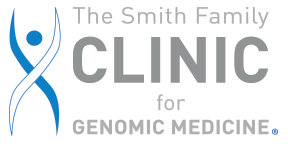Anna C.E. Hurst, MD, Medical Geneticist, has been serving as the Smith Family Clinic’s medical geneticist since 2021, following in the stead of David Bick, MD, PhD, who formerly held that role.
After graduating from genetic counseling training at University of South Carolina School of Medicine in Columbia, SC, Dr. Hurst completed medical school at Medical University of South Carolina in Charleston, SC, pediatric residency at Wake Forest Baptist Medical Center and genetics residency at University of Alabama at Birmingham (UAB). She is now a Medical Geneticist at UAB and Children’s of Alabama, as well as at the Smith Family Clinic for Genomic Medicine on the campus of HudsonAlpha Institute for Biotechnology.
Having seen firsthand the difference that genetic and genomic medicine can make in a patient’s life, Dr. Hurst is an advocate for integrating genetic testing and counseling in her patients’ care plans. She shares why she believes the Smith Family Clinic is uniquely poised to offer patients life-changing answers with Lillie Mermoud, HudsonAlpha Marketing and Development Specialist.
Lillie Mermoud: You primarily work at UAB and Children’s of Alabama as a medical geneticist. Can you describe what that means and what that looks like?
Anna Hurst (AH): As a geneticist, I mostly see children who have differences in how they learn, grow, or develop. I also see adults who have developed health problems that could have a genetic cause and people with a family history of genetic conditions that they may be at risk for. I regularly see patients in an office setting, but I also go to the hospital to evaluate inpatient children and adults at UAB and Children’s of Alabama.
LM: What inspired you to work in genetics?
AH: I grew up on a farm and remember being fascinated when we had a yellow dog who had a litter of black and brown puppies. So I have always loved the science of genetics! I first learned that you could combine genetics and helping people when I took a class called “Genetics in Human Affairs” when I was in college. We learned about how genetic conditions affect people and families, and we had genetic counselors come to speak in our class. I knew then that I wanted to do something using genetics to help people.
LM: You have been a part of the Smith Family Clinic’s team since 2021. Can you describe what your experience has been like working with the clinic?
AH: I’ve been working at the Smith Family Clinic for almost 2 years, and it has been a great experience. The entire team is focused on thinking creatively about how we can best meet our patients’ needs. We have a group of people who always put the patient first and focus on constantly improving the patient experience.
Together, we have redesigned how we schedule patients to increase how many people we can see while also decreasing wait times for appointments. Some patients only need to meet with a genetic counselor, while other patients benefit from also seeing a medical geneticist like me for a physical exam and medical management. Since I am only at the clinic two days a month, this new triaging system allows me to be as efficient as possible.
LM: In your professional opinion, why is it important to have a clinic, like the Smith Family Clinic, devoted to genomic medicine?
AH: Genomic medicine touches all aspects of medical care and all organ systems – from pediatrics to adults – and results can dramatically change a person’s medical care plan. Because the field is advancing so rapidly, it’s great to have one place where doctors can send their patients to get up-to-date genomics care.
LM: What value do genetic counseling and genomic medicine add to medical and clinical practice? How do you think it improves patient care?
AH: When we know the exact genetic cause of someone’s symptoms, we can understand what complications to monitor and how to treat them. This can streamline medical care and help patients focus on needs specific to them. For many conditions, a diagnosis helps us recommend specific management guidelines. For example, we can recommend that at certain ages, a person should get a particular screening exam. This means we can foresee and prevent potential complications to keep people healthy. Most excitingly, for some genetic conditions, there are new treatments and therapies!
LM: Can you speak to how the collaboration with genetic counselors at the clinic helps patients find answers?
AH: The team of genetic counselors at the Smith Family Clinic is outstanding! They are all compassionate, knowledgeable, and think deeply about their patients. The counselors can help patients understand the way genetic testing could impact them and their families.
Since the counselors are so skilled in their area of expertise, I can focus on thinking about symptoms, features, phenotypes, and diagnostic aspects of care and downstream management. I think this makes us the perfect team!
LM: What is your favorite part about working with the Clinic?
AH: The best thing is being a part of such a smoothly functioning, expert team! I love that we have the philanthropic support of the Hero Fund, which allows us to provide genome sequencing to patients who might not have the financial means for this testing but who medically need it. We also have a contract with the state Children’s Rehabilitative Service organization, which allows us to see many children who have developmental delays, autism, hearing loss, or birth differences and who need help.

